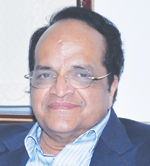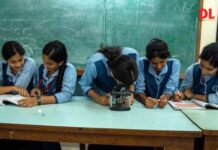The Mumbai Court has offered its interim verdict on the recent AICTE Notification. The verdict came in favour of two petitioners
J&K govt warns college teachers taking private tuitions
The state government of Jammu and Kashmir has warned college teachers taking private tuitions. The government said strict action will be taken against teachers who are giving private tuitions, in view of the blanket ban on such practice in the state. “Strict action shall be taken against those who indulge in private tuitions as government has imposed a blanket ban on private tuition by college teachers,” an official spokesman said. Though the government has allowed government school teachers and lecturers to take private tuitions, “No school teacher shall be allowed to take private tuitions during school hours,” he said. According to government estimates, there are 72 private coaching centres in Kashmir valley where nearly 30,000 students are enrolled each year.
Bhagalpur University Prof suspended on molestation charge
Prof Manish Chandra Verma is suspended by the Tilka Manjhi Bhagalpur University administration in Patna. The professor has been suspended on the basis of an interim probe report on allegations of sexual harassment of a research scholar by him. Verma who is a senior teacher in the university is accused of harassing a PhD scholar. The scholar also lodged a complaint with police besides making a representation to the SP in January 2011. She has written to the governor-cum-chancellor of the universities, the Chief Justice of India and various rights bodies. After the issue came to the fore the university authorities constituted a probe panel to look into the issue. It comprised of five Deans of Faculties and proctor Ratna Mukherjee. TMBU public relations officer Iqbal Ahmed said the teacher was suspended on March 1, 2011 on the basis of the probe panel's interim report. The suspended teacher has been transferred to Murarka College at Sultanganj till the panel submits its final report; Ahmed said and refused to divulge the contents of the “confidential” interim report. He also informed that the university administration has nominated three more women members to the probe panel. They are Harpal Kaur, Kiran Singh and Archana Kumari. Kaur and Singh are members of the university syndicate. Meanwhile, the suspension has evoked protests from the teachers' body. University Department Teachers Association secretary Dr Jagdhar Mandal said the association seeks withdrawal of the suspension order till the probe is completed. “You cannot punish anyone till the accusations against him are proved,” he said. Police, meanwhile, have registered a case under different IPC Sections and SC/ST (Prevention of Atrocities) Act against the teacher.
IGNOU provides healthy space for faculty
The Indira Gandhi National Open University (IGNOU) has claimed that In the past four years, the university has not only doubled its student strength, but has also contributed significantly to the nation's knowledge pool. It has, at the same time, ensured that its faculty is provided with the best of facilities to pursue research and remain at the vanguard of the academic community. The period between 2006-07 and 2009-10 saw student strength rise from 1.5 million to over 3 million and the number of programmes on offer go up from 129 to 486. The Open University claims that it has strived to become a more academically vibrant space. It has invested in academics, ensures that the faculty enjoys significant career growth. It has also encouraged research amongst its faculty members, the publication of papers and participation in seminars and conferences. This was not just limited to existing faculty, but to consultants and researchers as well. The strength of faculty
Nursery admission Criteria for Delhi schools to be out soon
Government of Delhi announced on Wednesday that schools will be allowed to set the criteria for nursery admissions but said they must reserve a quarter of their seats for poor families. Parents, however, feared the freedom will be misused. Education Minister Arvinder Singh Lovely, while making the announcement mentioned that 25% of the nursery seats have to be reserved for children of those parents, whose annual income is less than `100,000. Schools can randomly select from applicants in this category.
As for the remaining 75%, Lovely mentioned that the schools will be free to formulate their policy for admission but it should include criteria for categorizsation of the applicants. He also described that there should not be profiling of the child based on the parents' educational qualification and income. The parents, however, had doubts over the implementation. According to the guidelines, all the schools – both which are built on government land and others – will have to reserve 25% of their seats for the poor. At present, schools built on government land provide a quota of 15% to the economically weaker sections. Delhi has around 2,000 schools. The admission process will begin on January 1, 2011 and will be completed by March 31, 2011.
Panel to fix norms for private firms in IIITs
A six-member panel of experts from government and private industry has been set up by the Human Resource Development ministry to fix norms for selecting private firms who can participate in Public Private Partnership (PPP) for setting up 20 new Indian Institute of Information Technology.
London university looking into Gaddafi’s son plagiarism claims
The London School of Economics (LSE) said on Tuesday it was looking into claims that Colonel Muammer Gaddafi's son, Saif al-Islam, had plagiarised his doctorate thesis. “LSE is aware that there are allegations of plagiarism concerning the PhD thesis of Saif Gaddafi,” the university said in a statement. “The School takes all allegations of plagiarism very seriously, and is looking into the matter in accordance with standard LSE procedures.” Saif al-Islam studied at the LSE between 2003 and 2008 and left with a Master of Science degree and a doctorate. But, according to British media reports, he employed a ghostwriter and copied parts of his thesis. The LSE has already had to defend itself from criticisms over its involvement with the embattled Libyan leader after it emerged that the Gaddafi International Charity and Development Foundation had in 2009 pledged a donation worth 1.5 million pounds.
Employ-ability in High Growth Sectors
 The bookish knowledge of a new employee is not enough in the long run as sustainability is a big factor in the growth of an individual. Thus researching into the deficit, universities and industries are conducting workshops; experts from the industries are training students at various levels as per their needs. Short-time programmes are on the focus of both sides and are proving beneficial in the long run of enhanced employability skills
The bookish knowledge of a new employee is not enough in the long run as sustainability is a big factor in the growth of an individual. Thus researching into the deficit, universities and industries are conducting workshops; experts from the industries are training students at various levels as per their needs. Short-time programmes are on the focus of both sides and are proving beneficial in the long run of enhanced employability skills
By Jaydeep Saha
In recent times, our higher education system has been discussed in many fora with regard to its relevance and quality. India is ranked third in terms of graduates output next to that of USA and China, but in terms of quality, we are trailing, as hardly one percent of our students get quality education.
Today's high unemployment rates mask longer-term talent shortages that May affect both developing and developed countries for decades. The global population of 60 years and older will exceed that of 15-years-old or younger for the first time in history by 2050. But, the talent crisis will start much sooner. Barring technological breakthroughs, the United States, for example, will need to add 26 million workers to its talent pool by 2030 to sustain the average economic growth of the two past decades.
The global IT industry has been a big employer of young talent across the globe because of the increasing influence of IT in business transformation. The global meltdown is being seen as an opportunity to transform across the world and they are looking at IT to lead this transformation. IT has become “glocal”
Union Budget 2011-12
Education Overview
The Union Budget 2011 -12 saw high priority being given to secondary education keeping in mind India's demographic dividend and opportunity of seventy percent of the India's population being of working age by 2025. The allocation of higher education has been proposed for Rs 52,057 crore, an increase of 24 percent over the current year.
Sarva Shiksha Abhiyan
The Sarva Shiksha Abhiyan project has been an important tool for promoting elementary education. The budget provides for more positive measures by proposing an allocation of Rs 21,00 crore, a 40percent increase from the previous year's allocation of ` 15,000 crore.
A modified scheme of 'Vocationalisation of Secondary Education', which has been a centrally sponsored scheme, will be put into operation from 2011-12 to perk up the employable skills of the youth
The budget saw renewed emphasis being given to the promotion of education among the backward section of the population. While post metric scholarships have already been available, there has been a welcome introduction of pre-matric scholarship scheme in the 2011-12 budget. The scholarship scheme has been introduced for disadvantaged students belonging to the Scheduled Castes and Scheduled Tribes studying in ninth and tenth standard.
National Knowledge Network
The budget has proposed that the National Knowledge Network (NKN) will connect 1500 higher education and research institutes through an optical fibre backbone. 190 institutes will be linked through NKN in the present year. The proposal of connecting all 1500 institutions has been proposed to be done by March 2012, as the time for the creation of the core will extend till March 2011.
In order to promote innovations, the National Innovation Council under Sam Pitroda has been instituted to chalk out plans for promotion of innovations in India. Activities for setting up of the State Innovation Councils in every State and Sectoral Innovation Councils aligned to Central Ministries are also underway.
Skill Development
Emphasising on the success of the National Skill Development Council (NSDC) in achieving its target of the creation of skilled workforce, an additional Rs 500 crore has been allocated to NSDC for carrying forward its mandate of creating employable skills to the youth.
They speak on Budget 2011-12
 An increase in the number of scholarships for SC/ST students is definitely in line with inclusive higher education and social mobility. Prime Minister's national skill mission is given ample priority. Minority education is also being advanced. As anticipated , overall it has been a good budget.
An increase in the number of scholarships for SC/ST students is definitely in line with inclusive higher education and social mobility. Prime Minister's national skill mission is given ample priority. Minority education is also being advanced. As anticipated , overall it has been a good budget.
Prof V N Rajasekharan Pillai
Vice Chancellor,
Indira Gandhi National Open University
 Increased allocation in RTE is a good sign and states will be able to implement it more effectively
Increased allocation in RTE is a good sign and states will be able to implement it more effectively
IGNOU Going Full-throttle in Tourism & Hospitality
 The IGNOU School of Tourism, Hospitality Services Management has come up with not only training people but also providing excellent placements in leading organisations in the country for aspirants in the Tourism and Hospitality Sector
The IGNOU School of Tourism, Hospitality Services Management has come up with not only training people but also providing excellent placements in leading organisations in the country for aspirants in the Tourism and Hospitality Sector
The training cell of the School of Tourism, Hospitality Services Management (SOTHSM) of Indira Gandhi National Open University (IGNOU) at the Regional Centre Bhopal in collaboration with Tourism Department, Government of Madhya Pradesh is an initiative and way forward to develop and design vocational training programmes for human resource development in the tourism sector.
The Preparatory Steps
At the very basic level a detailed project report for training 320 students in housekeeping, front desk operations, food and beverage was prepared and submitted to Madhya Pradesh State Tourism Development Corporation. Further to that the project was sanctioned under the scheme of Capacity building for service providers.
An MOU was signed between the Madhya Pradesh State Tourism Development Corporation (MPSTDC) and Indira Gandhi National Open University for the development of the certificate programme and diploma in Hotel operations on Monday 05th January 2009 by the registrar of the IGNOU and the Principal Secretary Madhya Pradesh State Tourism Development Corporation in the presence of Hon. Vice Chancellor and State Tourism Minister.
The project allowed a detailed picture of the expenditure on faculty fees, food, tool kit, uniform, study material and administrative contingency. Nevertheless, the study material was prepared by a group of experts but was essentially approved by the Tourism department. The local needs of the hotel industry were ascertained and contents were tailored to meet its needs. This was critical to make the training employment oriented.
The Areas Of Training
The course was focused to customise it for an industry-specific and job-oriented programme. In consultation with the stakeholders the certificate courses were prepared in following three sectors:
-
Certificate in Front Office Operations (CFO)
-
Certificate in Housekeeping Operations (CHO)
-
Certificate in Food & Beverage Service Operations (CFBO)
Nine books were developed at the Regional Centre level in self instruction mode by the subject experts drawn from various institutions on; -
Understanding Tourism
-
Functional communicative skills and personnel grooming
-
Destination Madhya Pradesh
-
Front office operations Part-1
-
Front Office operations Part-2 (Practical manual)
-
Housekeeping operations Part-1
-
Housekeeping operations Part-2 (Practical manual )
-
Food and beverage service operations Part-1
-
Food and beverage service operations Part-2 (Practical manual)
Special Features of the Project
The course was designed specifically to which includes 60 days of intensive class room sessions and intensive Practical Industrial training in core areas for 60 days in the finest hotel of the Madhya Pradesh.
Facilities extended to the students include, a low fee structure Rs.3000/- per student, free study material and training kits, lunch and refreshments during class room training, two sets of uniforms (including shoes), stipend Rs.1500/- every month during hotel internship.
In the admission process the eligibility criteria is 10+2 in any stream with a minimum 45% marks for Certificate in Front Office Operations (CFO) and Certificate in Food & Beverage Service Operations (CFBO) and 10th with a minimum 45% marks and the batch size- 40 trainees/batch /programme.
The Study Centres of the course are Madhya Pradesh Institute of Hospitality Training (MPIHT) Bhopal, for CFO and Institute of Hotel Management (IHM) Bhopal for CFBO and CHO.
Curriculum and Faculty
These certificate programmes are finely designed for a single stream to create an expertise in a specific stream which May help the student to focus for the selection of the functional area in the industry.
The faculty was identified from the Institute of Hotel Management (IHM), MPIHT, Frankfinn Finishing School and managers of reputed hotels.
SOTHSM finalised the time table, assigned classes to faculty and monitored the conducting of the contact sessions.
Preparation of assignments, guiding students for project work.
-
Log books for hotel training maintained by trainees and verified by manager/trainer.
-
Evaluation at the end of the classes.
-
Grading of students on the basis of their performance.
-
Certification by IGNOU R.C, Bhopal.
-
80% attendance in classroom and internship was mandatory.
Total number of students certified under Certificate in Front office Operations( CFO), Certificate in Housekeeping Operations (CHO) and Certificate in Food and beverage Service Operation(CFBO) is 87, 43 and 45. Of these according to the records maintained in the placement cell of IGNOU & MPIHT 80% of the students got job offers. These placements were effected in reputed companies like PVR, ITC Groups of Hotels, Barbeque nation and in reputed three star category hotels both inside and outside Madhya Pradesh.
These courses are designed with a multi-dimensional focus which generates the skilled personnel's for the growing tourism and hospitality sector of the state and facilitate the unemployed youth of the state to enhance their skill and avail the benefits of the jobs opportunities in the tourism and hospitality sector in the state and other parts of the country.
This course not only provides the basic technical knowledge about the hotel industry, but also helps in the improvement of personality and communicative skills of the students, which help these students to enter the booming tourism sector.



















